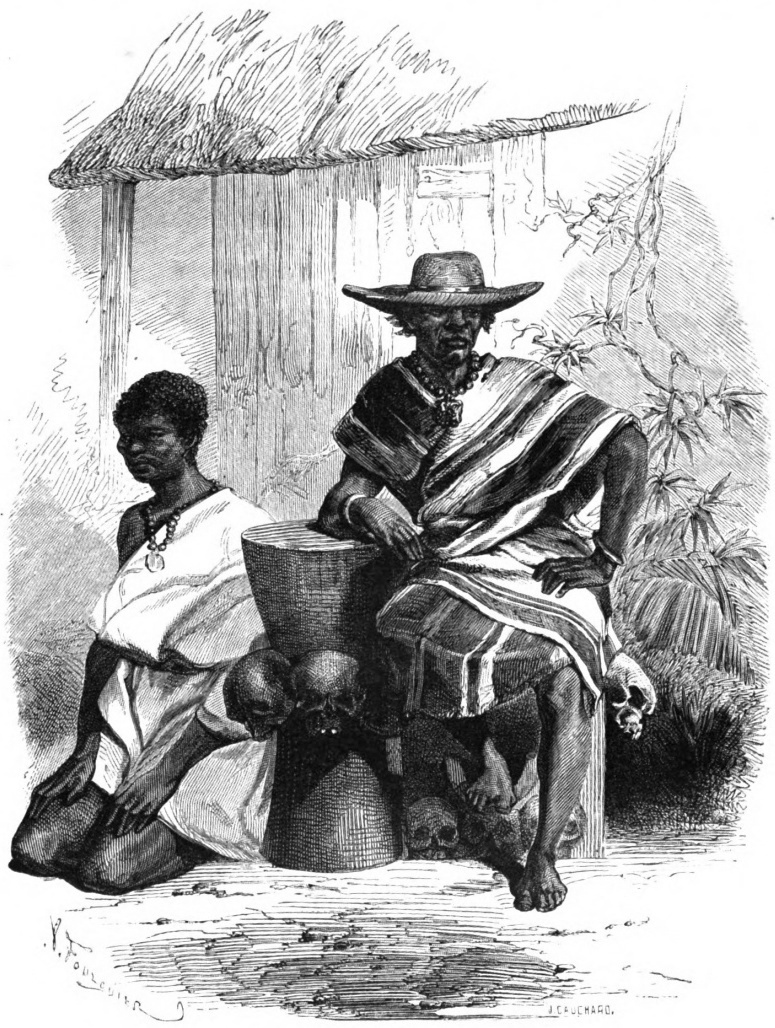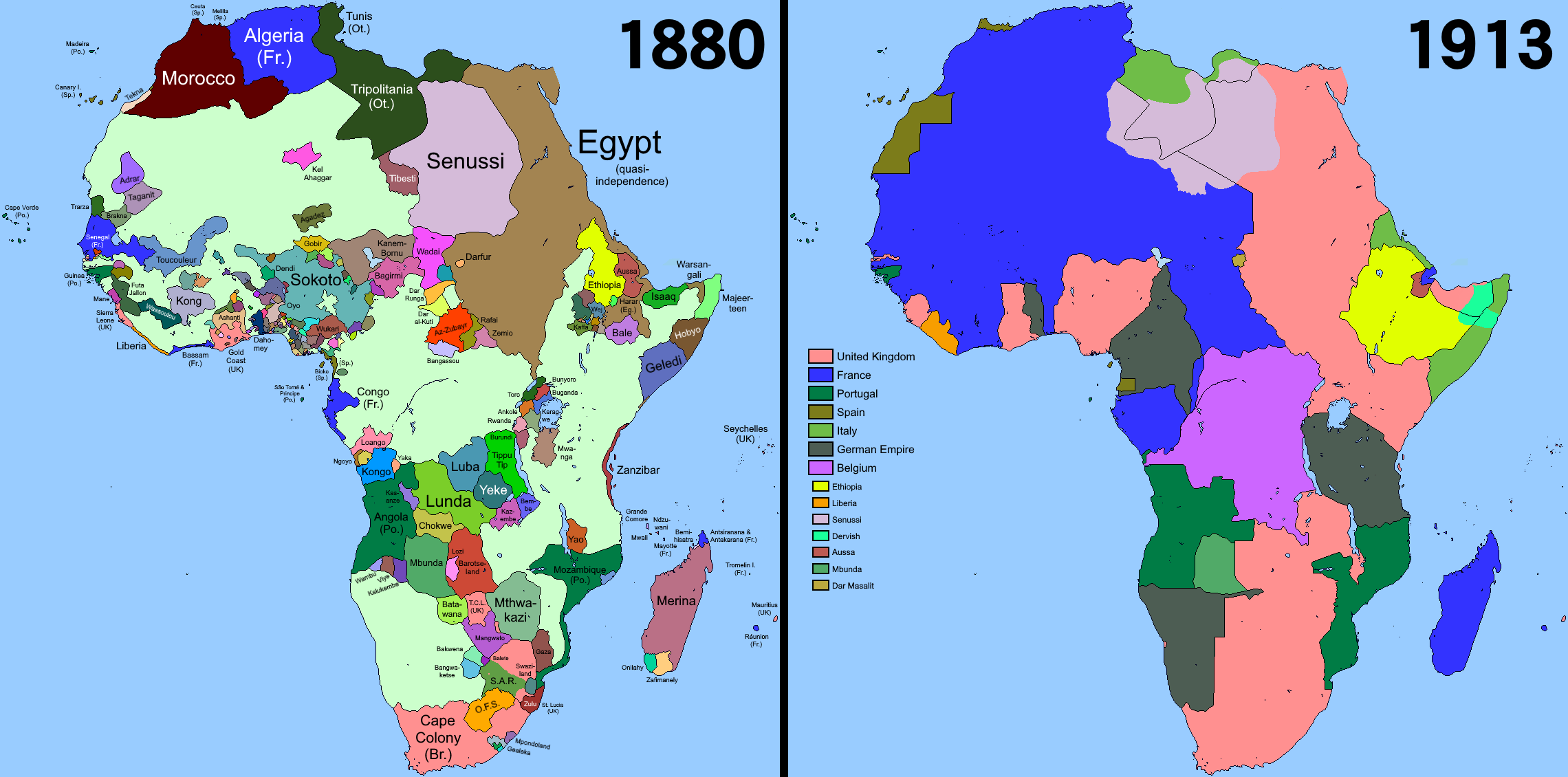|
Yaya Migansi
Yaya Migansi or Houekode ( 1850–1932) was a princess of Dahomey, a kingdom in present-day Benin. Her father was Glele (died 1889), who was the 10th king of Dahomey from 1858 to 1889. Her mother was Miagbe, also known as Hoonon Magnitin who gave birth to three sets of twins with Glele; Migansi was the first-born of the eldest pair of twins. Her name was Houekode, and the epithet "Yaya", an affectionate term meaning "old woman" is thought to refer to her mother. As her father was the future king, she and her sister were married to the two leading ministers of the kingdom: the name "Migansi" means wife or dependant of the "Migan" or prime minister. Migansi held the position of Na Daho, "eldest princess", one of the two chief offices within the royal family along with the Alodokponugan, the oldest brother of the king. She had a responsibility for the marital arrangements of her siblings and the choice of a successor to the king. When her father died in 1889, Migansi's brother Bé ... [...More Info...] [...Related Items...] OR: [Wikipedia] [Google] [Baidu] |
Dahomey
The Kingdom of Dahomey () was a West African List of kingdoms in Africa throughout history, kingdom located within present-day Benin that existed from approximately 1600 until 1904. It developed on the Abomey Plateau amongst the Fon people in the early 17th century and became a regional power in the 18th century by expanding south to conquer key cities like Ouidah, Whydah belonging to the Kingdom of Whydah on the Atlantic Ocean, Atlantic coast which granted it unhindered access to the tricontinental Atlantic slave trade, Atlantic Slave Trade. For much of the middle 19th century, the Kingdom of Dahomey became a key regional state, after eventually ending tributary status to the Oyo Empire. European visitors extensively documented the kingdom, and it became one of the most familiar African nations known to Ethnic groups in Europe, Europeans. The Kingdom of Dahomey was an important regional power that had an organized domestic economy built on conquest and Slavery, slave labor, si ... [...More Info...] [...Related Items...] OR: [Wikipedia] [Google] [Baidu] |
Benin
Benin, officially the Republic of Benin, is a country in West Africa. It was formerly known as Dahomey. It is bordered by Togo to the west, Nigeria to the east, Burkina Faso to the north-west, and Niger to the north-east. The majority of its population lives on the southern coastline of the Bight of Benin, part of the Gulf of Guinea in the northernmost tropical portion of the Atlantic Ocean. The capital is Porto-Novo, and the seat of government is in Cotonou, the most populous city and economic capital. Benin covers an area of , and its population in was estimated to be approximately million. It is a tropical country with an economy heavily dependent on agriculture and is an exporter of palm oil and cotton. From the 17th to the 19th century, political entities in the area included the Kingdom of Dahomey, the city-state of Porto-Novo#History, Porto Novo, and other states to the north. This region was referred to as the Slave Coast of West Africa from the early 17th century due ... [...More Info...] [...Related Items...] OR: [Wikipedia] [Google] [Baidu] |
Glele
Glele, or Badohou (died December 29, 1889), was the tenth King of Dahomey, ruling from 1858 until his suicide in 1889. Life Badohou, who took the throne name Glele, is considered (if Adandozan is not counted) to be the tenth King of the Aja kingdom of Dahomey (part of modern-day Benin). He succeeded his father, Ghezo, and ruled from 1858 to 1889. Glele continued his father's successful war campaigns, in part to avenge his father's death, and to capture slaves. During his rule he sustained Dahomey's renaissance as a center of palm oil sales and slave trade. Glele also signed treaties with the French, who had previously acquired a concession in Porto-Novo from its king. The French were successful in negotiating with Glele and receiving a grant for a customs and commerce concession in Cotonou during his reign. Glele resisted British diplomatic overtures, however, distrusting their manners and noting that they were much more activist in their opposition to the History of slavery, sl ... [...More Info...] [...Related Items...] OR: [Wikipedia] [Google] [Baidu] |
Béhanzin
Gbehanzin also known as Béhanzin ( – 10 December 1906) is considered the eleventh (if Adandozan is not counted) King of Dahomey, modern-day Republic of Benin. Upon taking the throne, he changed his name from Kondo. Following his father Glele's suicide, Béhanzin ascended the throne in January 1890 and ruled until 1894, when he was defeated by the French in the Second Franco-Dahomean War and exiled to Martinique. Béhanzin was Dahomey's last independent ruler established through traditional power structures. He led the resistance to French colonization of his kingdom, during the Dahomey Wars. Biography Béhanzin was seen by his people as intelligent and courageous. He saw that the Europeans were gradually encroaching on this section of the West African Coast, and as a result attempted a foreign policy of isolating the Europeans and rebuffing them. As prince just before the death of his father Glele, Béhanzin declined to meet French envoy Jean Bayol, claiming conflic ... [...More Info...] [...Related Items...] OR: [Wikipedia] [Google] [Baidu] |
Abomey
Agbome or Abomey is the capital of the Zou Department of Benin. The commune of Abomey covers an area of 142 square kilometres and, as of 2012, had a population of 90,195 people. Abomey houses the Royal Palaces of Abomey, a collection of small traditional houses that were inhabited by the Kings of Dahomey from 1600 to 1900, and which were designated a World Heritage Site by UNESCO in 1985.Butler, Stuart (2019) ''Bradt Travel Guide - Benin'', pgs. 135-45 History Abomey was founded in the 17th century as the capital of the Kingdom of Dahomey (1600–1904), on the site of the former village of Kana. Traditional legends state that the town was founded by Do-Aklin, a son of the king of Allada who ventured north to found his own kingdom; the name is thought to come from Danhomé, also spelled Danxomé, meaning "belly of Dan", Dan being the original chief of the village. Dahomey expanded rapidly in the 1700s, absorbing many of the surrounding kingdoms, and growing rich from the slave ... [...More Info...] [...Related Items...] OR: [Wikipedia] [Google] [Baidu] |
Agoli-agbo
Agoli-agbo is considered to have been the twelfth and final King of Dahomey. He was in power from 1894 to 1900. Biography He took the throne after the previous king, Béhanzin, went into exile after being defeated in the invasion of Dahomey by French Third Republic, France in the Second Franco-Dahomean War. The exile of Béhanzin did not legalize the French colonization. The French general Alfred-Amédée Dodds offered the throne to every one of the immediate royal family, in return for a signature on a treaty establishing a French protectorate over the Kingdom (politics), Kingdom; all refused. Finally, on January 15, 1894, Béhanzin's Army Chief of Staff Prince Agoli-agbo (whose name meaning "the dynasty has not fallen"), brother of Béhanzin and son of King Glélé, signed. He was appointed to the throne, as a 'traditional chief' rather than head of state of a sovereign nation, by the French when he agreed to sign the instrument of surrender. He 'reigned' for only six years ... [...More Info...] [...Related Items...] OR: [Wikipedia] [Google] [Baidu] |
1850s Births
Year 185 ( CLXXXV) was a common year starting on Friday of the Julian calendar. At the time, it was known as the Year of the Consulship of Lascivius and Atilius (or, less frequently, year 938 ''Ab urbe condita''). The denomination 185 for this year has been used since the early medieval period, when the Anno Domini calendar era became the prevalent method in Europe for naming years. Events By place Roman Empire * Nobles of Britain demand that Emperor Commodus rescind all power given to Tigidius Perennis, who is eventually executed. * Publius Helvius Pertinax is made governor of Britain and quells a mutiny of the British Roman legions who wanted him to become emperor. The disgruntled usurpers go on to attempt to assassinate the governor. * Tigidius Perennis, his family and many others are executed for conspiring against Commodus. * Commodus drains Rome's treasury to put on gladiatorial spectacles and confiscates property to support his pleasures. He participates a ... [...More Info...] [...Related Items...] OR: [Wikipedia] [Google] [Baidu] |
1932 Deaths
Events January * January 4 – The British authorities in India arrest and intern Mahatma Gandhi and Vallabhbhai Patel. * January 9 – Sakuradamon Incident (1932), Sakuradamon Incident: Korean nationalist Lee Bong-chang fails in his effort to assassinate Emperor Hirohito of Japan. The Kuomintang's official newspaper runs an editorial expressing regret that the attempt failed, which is used by the Japanese as a pretext to attack Shanghai later in the month. * January 22 – The 1932 Salvadoran peasant uprising begins; it is suppressed by the government of Maximiliano Hernández Martínez. * January 24 – Marshal Pietro Badoglio declares the end of Libyan resistance. * January 26 – British submarine aircraft carrier sinks with the loss of all 60 onboard on exercise in Lyme Bay in the English Channel. * January 28 – January 28 incident: Conflict between Japan and China in Shanghai. * January 31 – Japanese warships arrive in Nanking. February * February 2 ** A general ... [...More Info...] [...Related Items...] OR: [Wikipedia] [Google] [Baidu] |
Kingdom Of Dahomey
The Kingdom of Dahomey () was a West African kingdom located within present-day Benin that existed from approximately 1600 until 1904. It developed on the Abomey Plateau amongst the Fon people in the early 17th century and became a regional power in the 18th century by expanding south to conquer key cities like Whydah belonging to the Kingdom of Whydah on the Atlantic coast which granted it unhindered access to the tricontinental Atlantic Slave Trade. For much of the middle 19th century, the Kingdom of Dahomey became a key regional state, after eventually ending tributary status to the Oyo Empire. European visitors extensively documented the kingdom, and it became one of the most familiar African nations known to Europeans. The Kingdom of Dahomey was an important regional power that had an organized domestic economy built on conquest and slave labor, significant international trade and diplomatic relations with Europeans, a centralized administration, taxation systems, ... [...More Info...] [...Related Items...] OR: [Wikipedia] [Google] [Baidu] |






